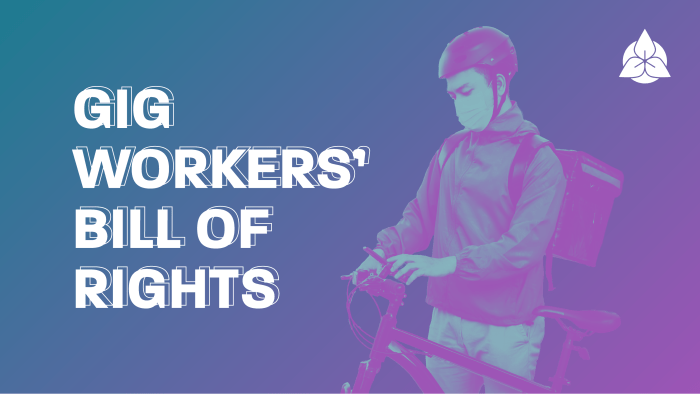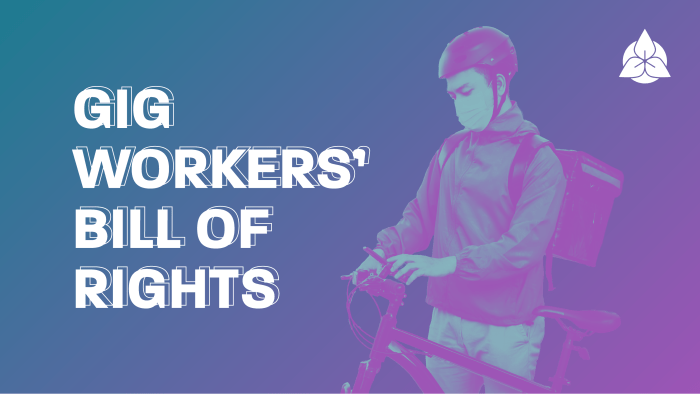
EU Gig Worker Rights: Companies Push Back on Amended Proposal
EU countries amend draft proposal on gig workers rights triggering discontent among companies, the latest development in the ongoing debate surrounding worker rights in the gig economy. This move, aimed at strengthening protections for gig workers, has sparked controversy, with companies expressing concerns about the potential impact on their businesses.
The proposed amendments aim to address issues like worker classification, minimum wages, paid leave, and health insurance, but they have raised questions about the future of the gig economy and the balance between worker rights and business flexibility.
The EU’s proposed amendments to gig worker rights are a response to the growing prevalence of platform-based work and the concerns about the lack of protections for workers in this sector. The proposed changes aim to clarify the definition of “gig worker,” establish minimum standards for working conditions, and provide clearer mechanisms for dispute resolution.
However, these changes have met with resistance from companies, who argue that they will stifle innovation, increase costs, and ultimately harm both workers and businesses.
EU Gig Worker Rights Proposal

The European Union’s proposed amendments to gig worker rights are a significant development in the evolving landscape of labor relations. This proposal aims to address the challenges and concerns that have arisen with the increasing prevalence of gig work in the EU.
It is a response to the growing need to ensure fair and equitable working conditions for workers in the gig economy.
History and Evolution of Gig Work in the EU
Gig work, encompassing various forms of non-standard employment like platform work, freelancing, and temporary work, has been steadily gaining traction in the EU. The rise of digital platforms and online marketplaces has accelerated this trend, creating new opportunities for workers while also raising concerns about their employment status and rights.
- Gig work has become increasingly popular in the EU, driven by factors such as technological advancements, the rise of digital platforms, and economic flexibility.
- The growth of the gig economy has led to a diverse range of gig workers, including delivery drivers, ride-hailing services, online freelancers, and platform-based service providers.
- While gig work offers flexibility and autonomy, it has also raised concerns about worker rights, employment status, and social security coverage.
Existing Legal Framework for Gig Workers in the EU
The legal framework for gig workers in the EU is complex and fragmented. While some EU legislation addresses certain aspects of gig work, there is no single, comprehensive framework that specifically governs this sector.
- The EU’s existing legal framework for gig workers is largely based on existing employment law principles, which may not always adequately address the specific challenges of gig work.
- The European Court of Justice (ECJ) has issued several rulings on the employment status of gig workers, providing some clarity but also highlighting the complexities involved.
- Some EU member states have implemented national legislation to address gig work, but these laws vary in their scope and effectiveness.
Challenges and Concerns Regarding Gig Worker Rights in the EU
Several challenges and concerns have been raised regarding gig worker rights in the EU. These include:
- Employment Status and Labor Rights:Determining the employment status of gig workers (employee vs. self-employed) is crucial for determining their labor rights, such as minimum wage, working time, and social security coverage. The EU’s proposed amendments aim to clarify the employment status of gig workers and ensure they are entitled to basic labor rights.
- Social Security Coverage:Gig workers often lack adequate social security coverage, including pensions, unemployment benefits, and healthcare. The EU’s proposed amendments aim to address this issue by ensuring gig workers have access to social security benefits.
- Platform Algorithmic Transparency:The use of algorithms by platforms can raise concerns about fairness, transparency, and discrimination. The EU’s proposed amendments aim to enhance algorithmic transparency and ensure that gig workers are treated fairly.
- Collective Bargaining Rights:Gig workers often lack the collective bargaining rights enjoyed by traditional employees. The EU’s proposed amendments aim to facilitate collective bargaining for gig workers, allowing them to negotiate better working conditions.
Objectives and Goals of the Proposed Amendments
The proposed amendments aim to address the challenges and concerns regarding gig worker rights in the EU. Their main objectives and goals are:
- Clarify the Employment Status of Gig Workers:The proposed amendments aim to establish clear criteria for determining the employment status of gig workers, ensuring they are properly classified as either employees or self-employed.
- Ensure Basic Labor Rights for Gig Workers:The proposed amendments aim to guarantee basic labor rights for gig workers, including minimum wage, working time, and health and safety standards.
- Improve Social Security Coverage for Gig Workers:The proposed amendments aim to ensure gig workers have access to adequate social security benefits, including pensions, unemployment benefits, and healthcare.
- Enhance Platform Algorithmic Transparency:The proposed amendments aim to increase transparency in the use of algorithms by platforms, ensuring fair and non-discriminatory treatment of gig workers.
- Facilitate Collective Bargaining for Gig Workers:The proposed amendments aim to create a framework that enables gig workers to engage in collective bargaining, allowing them to negotiate better working conditions and secure better pay.
Key Provisions of the Amended Proposal

The EU’s amended proposal for gig worker rights introduces significant changes aimed at improving working conditions and ensuring fairer treatment for workers in the gig economy. The proposal seeks to address concerns regarding precarious employment and the lack of traditional worker protections in platform-based work.
Definition of “Gig Worker”
The amended proposal aims to clarify and broaden the definition of “gig worker” to encompass a wider range of individuals engaged in platform-based work. This includes workers who are not formally employed by the platform but perform tasks through their interface, such as delivery drivers, ride-hailing services, and online platform workers.
The proposal seeks to ensure that workers who are economically dependent on a platform, even if they are classified as self-employed, are covered by the proposed protections.
The EU’s push for stronger gig worker rights is definitely stirring things up, with companies expressing their concerns. It’s a complex issue, but it’s interesting to see how the EU’s approach contrasts with the growth Apple has experienced in China, as explored in this article about Apple’s prosperity in China and the promising future in Asian markets.
Perhaps there are lessons to be learned from both sides of the coin when it comes to balancing worker rights with economic growth. Ultimately, finding the right balance for the gig economy will be key to ensuring a sustainable future for both workers and businesses.
Working Conditions
The proposal includes provisions regarding minimum wages, paid leave, and health insurance for gig workers.
Minimum Wages
The proposal mandates that platform businesses ensure gig workers receive at least the national minimum wage for the hours worked, including time spent waiting for assignments. This provision aims to address concerns about low earnings and income instability experienced by many gig workers.
Paid Leave
The proposal grants gig workers the right to paid annual leave, sick leave, and parental leave, proportional to the hours worked. This provision aims to provide gig workers with basic employment benefits that are typically available to traditional employees.
Health Insurance
The proposal encourages platform businesses to contribute to health insurance schemes for gig workers, either through a collective insurance scheme or by providing individual insurance options. This provision aims to address the lack of health insurance coverage often faced by gig workers, particularly those classified as self-employed.
Worker Classification and Dispute Resolution, Eu countries amend draft proposal on gig workers rights triggering discontent among companies
The amended proposal introduces mechanisms for worker classification and dispute resolution.
Worker Classification
The proposal establishes a presumption of employment status for gig workers who meet certain criteria, such as working exclusively or predominantly for a single platform. This presumption shifts the burden of proof onto the platform to demonstrate that the worker is genuinely self-employed.
The EU’s recent amendment to the draft proposal on gig worker rights has sparked a wave of discontent among companies, with many arguing that the new regulations will stifle innovation and flexibility. It’s a complex issue, much like navigating the ever-changing world of investments, as detailed in unleashing the oracle of omahas success the journey of warren buffett.
Ultimately, the goal is to find a balance that protects worker rights while fostering a thriving gig economy, a delicate tightrope walk that requires careful consideration of all stakeholders.
Dispute Resolution
The proposal provides for an efficient and accessible dispute resolution mechanism for gig workers. This mechanism allows workers to raise concerns about their classification, working conditions, and other issues directly with the platform or through a designated body.
Potential Impact
The amendments are expected to have a significant impact on the gig economy and platform businesses.
Impact on Gig Economy
The proposed changes aim to improve working conditions and provide greater legal certainty for gig workers. They could lead to increased stability and protection for workers in the gig economy, potentially attracting more individuals to this form of work.
The EU’s recent amendment to the draft proposal on gig worker rights has sparked a wave of discontent among companies, particularly those operating in the gig economy. While the aim is to protect workers, the new regulations are seen as overly burdensome by some.
It’s interesting to note that Vitalik Buterin, co-founder of Ethereum, recently appeared on Bloomberg Studio 10, where he discussed the potential of blockchain technology to address some of the challenges facing the gig economy. His insights highlight the need for innovative solutions as the EU grapples with finding the right balance between worker rights and economic growth.
Impact on Platform Businesses
The amendments could increase costs for platform businesses, particularly in relation to minimum wages, paid leave, and health insurance contributions. However, they could also lead to improved worker satisfaction and loyalty, potentially reducing turnover and enhancing the platform’s reputation.
Reactions and Discontent Among Companies
The proposed amendments to EU gig worker rights have sparked significant concern and discontent among companies operating within the gig economy. These concerns stem from a range of factors, including the potential economic and operational implications, as well as the perceived impact on innovation and job creation within the sector.
Concerns Raised by Companies
Companies operating in the gig economy have raised a number of concerns regarding the proposed amendments. These concerns are primarily centered around the potential impact on their business models, operational flexibility, and overall cost structure.
- Increased Labor Costs:Companies are worried that the proposed amendments, particularly those relating to the classification of workers as employees, will lead to a significant increase in labor costs. This is because employers will be required to provide benefits and protections, such as paid leave, sick pay, and social security contributions, to gig workers who are classified as employees.
- Reduced Flexibility:The proposed amendments may also limit the flexibility that companies currently enjoy in managing their workforce. For example, the requirement to provide workers with a minimum wage and paid leave could restrict the ability of companies to adjust their workforce to meet fluctuating demand.
- Increased Administrative Burden:Companies are also concerned about the increased administrative burden that the proposed amendments will impose. They argue that complying with new regulations, such as record-keeping requirements and reporting obligations, will require significant resources and potentially hinder their operations.
- Uncertainty and Legal Challenges:The proposed amendments have created uncertainty for companies regarding the legal status of their workers. This uncertainty could lead to legal challenges and disputes, which can be costly and time-consuming.
Potential Consequences and Future Outlook: Eu Countries Amend Draft Proposal On Gig Workers Rights Triggering Discontent Among Companies

The proposed amendments to EU gig worker rights have sparked considerable debate and raise several questions about their potential consequences and future outlook. While the aim is to provide better protection for gig workers, the amendments have also raised concerns about their impact on businesses and the future of the gig economy in the EU.
Potential Legal Challenges
The proposed amendments are likely to face legal challenges from various stakeholders. Companies operating in the gig economy may argue that the proposed regulations infringe on their freedom to contract and create unnecessary burdens. They may also challenge the classification of workers as “employees” based on the proposed criteria, arguing that it overreaches and creates legal uncertainty.
The amendments could also face challenges based on principles of proportionality and non-discrimination. Companies might argue that the regulations disproportionately affect certain sectors or business models, potentially leading to unfair competition and economic distortions. Additionally, there may be challenges related to the interpretation and application of the proposed regulations, especially in cross-border situations.
The EU Commission will need to provide clear guidance and ensure consistent application across member states to avoid legal complexities and inconsistencies.
Likelihood of Adoption and Implementation
The likelihood of the amendments being adopted and implemented depends on various factors, including the political will of the European Parliament and the Council of the EU, the level of support from member states, and the strength of opposition from companies and other stakeholders.
While the proposed amendments have received significant support from trade unions and worker advocacy groups, they have also faced opposition from businesses and industry associations. The final outcome will likely involve negotiations and compromises to address concerns from both sides.The European Commission will need to navigate these competing interests and ensure that the final legislation balances the need to protect workers’ rights with the need to maintain a vibrant and competitive gig economy in the EU.
Alternative Approaches to Regulating Gig Work
While the proposed amendments focus on a broad definition of employment status, alternative approaches to regulating gig work exist. These include:
- Sector-specific regulations: This approach would tailor regulations to specific gig work sectors, such as ride-hailing or delivery services, taking into account their unique characteristics and challenges. This could lead to more targeted and effective regulations that address the specific needs of each sector.
- Platform-specific regulations: This approach would focus on regulating individual platforms, such as Uber or Deliveroo, rather than the entire gig economy. This could allow for more flexible regulations that are tailored to the specific practices and business models of each platform.
- Focus on worker protection rights: Instead of focusing on employment status, this approach would focus on providing workers with essential rights, such as minimum wage, paid leave, and access to social security, regardless of their employment status. This approach could be more flexible and adaptable to the evolving nature of gig work.
The choice of approach will depend on various factors, including the political context, the specific challenges faced by the gig economy in different member states, and the evolving nature of gig work itself.
Long-Term Implications for the Gig Economy
The long-term implications of the proposed amendments for the future of the gig economy in the EU are significant. The amendments could have a profound impact on the business models of gig economy platforms and the employment opportunities available to gig workers.If the amendments are implemented as proposed, it is likely to lead to increased costs for companies operating in the gig economy.
This could lead to a reduction in the number of available gig work opportunities or a shift towards more traditional employment models. However, the amendments could also lead to a more stable and secure gig economy, with workers enjoying greater rights and protections.
This could attract more workers to the gig economy, creating a larger pool of talent and innovation.The long-term impact of the proposed amendments will depend on how they are implemented and the response of companies and workers. The EU will need to monitor the impact of the amendments and make adjustments as necessary to ensure that they achieve their intended goals of providing greater protection for gig workers while maintaining a vibrant and competitive gig economy in the EU.

